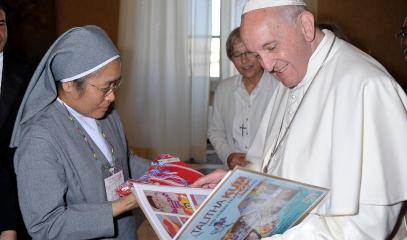Sister Marie Agnes' mission on the frontline against child trafficking
The tools used by human traffickers are evolving from tourism to social media. The nun works through training courses, also in schools, involving teachers and headmasters and says new approaches are needed to meet the challenge. Yesterday the Pope's message on the day of prayer promoted by the Church.
Bangkok (AsiaNews) - From tourism to social media via the internet, the means used by exploiters to fuel human trafficking have multiplied in recent years. Fighting against human trafficking is the mission of Sister Marie Agnes Buasap, of the Hospital Sisters of St. Paul of Chartres, who since 1984 has been at the forefront of a widespread programme of prevention, information – aimed at young people as well as parents, teachers and educators – and recovery.
As coordinator of Talitha Kum Thailand, she has led meetings, seminars and training courses reaching at least 52,466 students in 35 schools, integrating awareness-raising against trafficking into the curriculum.
This fundamental work, also recalled yesterday by Pope Francis in his message for the Day of Prayer against this phenomenon, which the Church celebrates on the feast day of Saint Josephine Bakhita.
Its innovative strategies inspire educators to proactively combat trafficking, addressing its complex realities. ‘As an educator working within the school system,’ Sister Marie tells AsiaNews, ‘I work with the Congregation of St. Paul, which runs 24 schools throughout Thailand, including the border areas and the capital. We also work with 10 diocesan schools’.
The nun admits that, today, children and young people run greater risks in terms of human trafficking, especially those related to the use of social networks, which is one of the most important areas of Talitha Kum Thailand's work.
’We integrate anti-trafficking education into various subjects in the curriculum. We conduct training sessions in different schools to help teachers integrate this awareness into their teaching and activities. Each school also implements its own campaigns adapted to the context and guarantees children and young people access to support systems’.
Sister Marie Agnes Buasap shares some examples of her work, which help to raise awareness among children and adults. ‘Through our programmes in schools, we train teachers to integrate’ the subject ‘into their lessons. We also provide direct training to students and have been invited to share information with local community groups and young people from hill tribes,’ she explains.
‘During our training sessions, we often learn about and provide assistance to students and even teachers who have been victims of trafficking. In some cases, we work with our network to take legal action.’
And it is not uncommon for her to work with the guardians and parents themselves to help them understand the dynamics of trafficking and how to prevent it.
For the nun, modern technology, such as mobile phones and internet access, increases the risks for children and teenagers in Thailand, as in the rest of the world.
‘Social media,’ she explains, ‘represents a serious threat to children and teenagers. Although phones have become necessary for daily life and education, the same device can conceal dangers. Children are often bullied or groomed through these means, and this problem intensified during the great [Covid-19] pandemic, when children could not attend school and spent more time online’ with distance learning.
Then there is the tourism issue, given that Thailand is one of the main destinations in Asia. The capital, Bangkok, and Pattaya in particular are among the most popular places and for this reason the nun hopes that stricter measures will be adopted to reduce sex trafficking in these areas.
‘As far as strict measures to reduce human trafficking are concerned, I believe that there are already sufficient regulations. What needs to be improved,’ she warns, ’is their application and a more serious implementation of sanctions, especially for crimes against children and young people.’
Another factor is the training of teachers and school administrators, who sometimes seem not to recognise or underestimate the dangers associated with human trafficking or consider the issue only from a sexual point of view, connected to prostitution.
To overcome the challenge, she emphasises, personalised dialogues and innovative approaches are also needed, motivating school management and teaching staff to integrate these crucial issues into their curricula without increasing the existing workload.
‘The winning resources are then shared throughout our network of schools, creating a valuable archive of teaching materials’.
The scope of the mission of the nun and the institution she coordinates is also evident in the numbers: in at least 35 schools where the Talitha Kum team has conducted workshops ‘we have trained 87 religious workers and 3,095 teachers, [...] reaching 52,466 students.
The response was positive, with several schools implementing activities suited to their context. We are still convinced,’ she adds, ’that the more children and young people we can protect from trafficking, the fewer victims we will have to rehabilitate (which is much more difficult).
The congregation of the Sisters of Saint Paul of Chartres was founded in France in 1696. The first nun arrived in Thailand in 1898, where today they are present in 11 dioceses. They began their mission at Saint Louis Hospital in Bangkok, followed seven years later by educational work at Assumption Convent School, which celebrates its 120th anniversary in 2025.
‘We run two hospitals: Saint Louis Hospital in Bangkok and Saint Mary's Hospital in Nakhon Ratchasima. We also run 24 schools, including four free schools, and we work in 10 diocesan schools. Finally, we run homes for the elderly and for children with HIV and we carry out awareness-raising activities in remote villages,’ she concludes.





.jpeg)

.jpeg)

.png)










